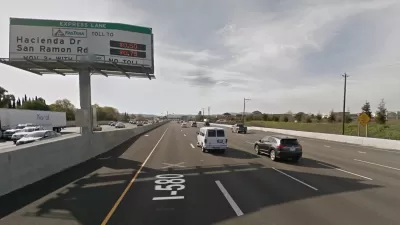$15 million in a U.S. Department of Transportation grant program is now available for states to implement pilot projects based on a "user-based alternative revenue mechanism," aka vehicle-miles-traveled fee.
As most Planetizen readers know, Congress has chosen to continue the transportation funding practice, first begun in 2008, of transferring tens of billions of dollars from the General Fund to the Highway Trust Fund, though now they use what can best be described as gimmicks (also known as "pay-fors") to offset the transfers.
The largest such transfer, $70 billion, resulted from the passage of the 5-year, transportation bill, Fixing America's Surface Transportation Act or "FAST Act" last December. It was "paid-for" by selling oil in the Strategic Petroleum Reserves, liquidating a Federal Reserve surplus account, et.al., as noted earlier.
But what Congress also did was to include funding for states to essentially do what Congress couldn't or wouldn't do. No, I refer not to increasing the federal gas tax, but to paving the path toward a sustainable funding mechanism, the vehicle-miles-traveled (VMT) fee, which is immune from increases in vehicle fuel efficiency, and the shift, even if slow, to electric vehicles.
A Federal Highway Administration (FHWA) press release Tuesday announced the availability of grants in 2016, year one of the 5-year, $95 million Surface Transportation System Funding Alternatives (STSFA) grant program.
The U.S. Department of Transportation's Federal Highway Administration today announced $15 million in grants for states under a new program to test alternative revenue mechanisms to help sustain the long-term solvency of the Highway Trust Fund.
Fiscal year 2016 2017 2018 2019 2020 Authorization $15 M
$20 M
$20 M
$20 M
$20 M
Credit: FAST Act.
For the most part, that means adopting vehicle-miles-traveled (VMT) fee pilot programs like the California Road Charge Pilot that will begin this July, or the two pilots that preceded the OReGO program. However, don't expect to see "VMT fee." Instead, the program refers to "user-based alternative revenue mechanism," as if we didn't have enough terms to describe being charged for how much you drive as opposed to how much gas you burn.
"This program will take technological innovation to a new level and help to make the entire transportation network more reliable for commuters, businesses, and freight shippers," said U.S. Transportation Secretary Anthony Foxx in the press release.
However, Ben Miller, staff writer for Government Technology and FutureStructure, points to "a catch — the administration will only fund projects that can help out the Highway Trust Fund."
“The mechanism would ultimately need to demonstrate that it could effectively collect federal user fee revenue and be scalable nationally, but it could also be used to collect state user fee revenue,” Transportation Department spokesperson Nancy Singer wrote in an email. “It should be noted that during the demonstration, federal user fee revenue would not actually be collected; rather, the pilot approach would demonstrate how it could be collected.”
"The grants are only available to states or groups of states," notes the press release, thus groups like the Western Road Usage Charge Consortium would be eligible. See Bruce Melzer's extensive piece in Toll Road News last April on progress made by some of the members [see member map (PDF)]
Hat tip to AASHTO Daily Transportation Update.
FULL STORY: U.S. DOT Annouces First Year of Grant Funding for State VMT Fee Pilot Programs

Alabama: Trump Terminates Settlements for Black Communities Harmed By Raw Sewage
Trump deemed the landmark civil rights agreement “illegal DEI and environmental justice policy.”

Study: Maui’s Plan to Convert Vacation Rentals to Long-Term Housing Could Cause Nearly $1 Billion Economic Loss
The plan would reduce visitor accommodation by 25% resulting in 1,900 jobs lost.

Planetizen Federal Action Tracker
A weekly monitor of how Trump’s orders and actions are impacting planners and planning in America.

Wind Energy on the Rise Despite Federal Policy Reversal
The Trump administration is revoking federal support for renewable energy, but demand for new projects continues unabated.

Passengers Flock to Caltrain After Electrification
The new electric trains are running faster and more reliably, leading to strong ridership growth on the Bay Area rail system.

Texas Churches Rally Behind ‘Yes in God’s Back Yard’ Legislation
Religious leaders want the state to reduce zoning regulations to streamline leasing church-owned land to housing developers.
Urban Design for Planners 1: Software Tools
This six-course series explores essential urban design concepts using open source software and equips planners with the tools they need to participate fully in the urban design process.
Planning for Universal Design
Learn the tools for implementing Universal Design in planning regulations.
Caltrans
Smith Gee Studio
Institute for Housing and Urban Development Studies (IHS)
City of Grandview
Harvard GSD Executive Education
Toledo-Lucas County Plan Commissions
Salt Lake City
NYU Wagner Graduate School of Public Service




























